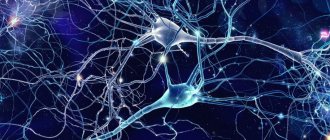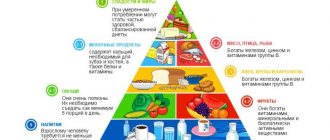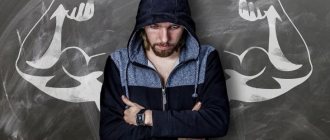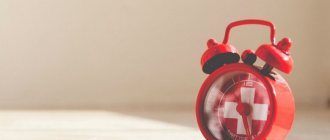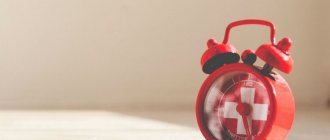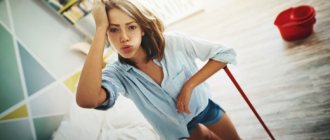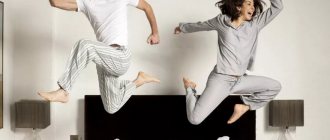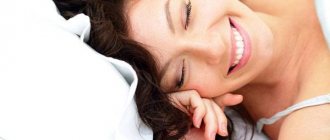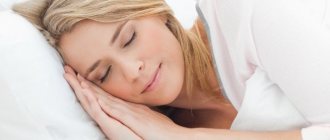The other day I listened to a 2-hour speech “Healthy Sleep” by neurologist and somnologist Elena Tsareva. I pulled out the most important points for myself:
- Sleeping regularly, going to bed and getting up at the same time is the most important thing.
- Biorhythms are partly inherited and partly regulated by lifestyle. You can influence them yourself.
- Normal bedtime is around 10:00 pm. An owl and a lark are a deviation of ±1-2 hours. More is a disruption and shift in sleep phase, often due to external stimuli.
- The most common cause of poor sleep and difficulty falling asleep is improper light.
- To shift the regime by 1 hour, the body needs 1 day to adapt.
- It is impossible to “finish” a sleepless night. Getting enough sleep only eliminates 30% of the effects of lack of sleep.
- Before looking for causes of poor sleep, rule out psychological problems (anxiety, depression), thyroid disorders, iron deficiency, diabetes, cardiovascular diseases and pathologies of the kidneys and genitourinary system.
- For drivers and passengers: 17 hours without sleep equals 0.5 ppm, 21 hours without sleep equals 0.8 ppm.
- Do not stay in bed without sleep for more than 15 minutes - advice for insomnia.
- The most physiological alarm clocks are those that glow.
Below the cut is a synopsis of a 2-hour speech about sleep for 15 minutes of reading. Another point to add to the collection of useful materials about sleep is Sleep Hackers.
Abstract navigation:
- The influence of sleep on work
- Causes of sleep disorders
- Sleep analysis
- Sleep tips
Skip to video.
Owls and larks are common folk concepts. In somnology there is the concept of “sleep phase shift.” Most people fall asleep around 10:00 pm. A sleep phase shift of more than 4 hours is no longer a night owl/lark, but rather a diagnosis of “sleep phase shift.”
If owls and larks are left indoors without identifiers such as sunlight, their rhythms will differ by an hour or two, no more. More - already hyper-owls and hyper-larks, this is just about the shift in sleep phase.
Biorhythms are partially regulated by genes, but there are also acquired features of biorhythms.
Owls and larks are equally effective if they perform tasks at intervals corresponding to their biorhythms. But early-morning employers are more biased towards their night-owl employees. Although if you allow an owl to shift his schedule for a couple of hours, he will produce results that are not inferior to a lark.
Biorhythms and work schedules are not always compatible. Nowadays, employers take biorhythms into account more and offer flexible schedules. Here's what it can do:
In Russia, workers sleep poorly at least 1 day a week.
The worst is for managers, the best is for employees and individual entrepreneurs.
A manager is often a leadership position, and poor quality sleep affects leadership, reducing creativity, memory, and concentration.
Consequences of lack of sleep
Some people are more “inspired” after a sleepless night. The state of stress in the body allows them to cope with lack of sleep in the first half of the day. But a person with a lack of sleep is more anxious and overeats more often, which in the future threatens to gain excess weight.
Sleep affects the immune response; if you don't get enough sleep, you're more likely to get sick.
RAM suffers; one sleepless night is enough for interruptions.
In Russia, 20% of road accidents are related to drowsiness. In Europe and the USA, professional drivers are examined regarding the quality of their sleep, for example, a professional driver will not be allowed to fly unless he provides a report on the treatment of snoring.
Even one “missed” night reduces the number of gray brain cells.
Chronic lack of sleep affects metabolism. Testosterone peaks during sleep. It causes morning erection. For those who are interested in knowing if his testosterone levels are okay, here is a samurai test from urologists. If you have a morning erection every day for 7 days, then everything is fine.
Growth hormone, which helps children grow, has a different function in adults. In adults, it is responsible for energy metabolism. This is the thing thanks to which you don’t wake up at night and go to the refrigerator, and in the morning after waking up you don’t experience a hellish feeling of hunger for another couple of hours. If you want to lose weight, sleep well.
Diabetes. Every second person now has problems with carbohydrate metabolism. If you feel sleepy after eating, it could be a sign of insulin resistance, which is often the start of diabetes.
Sleepy and drunk driver. 17 hours without sleep equals 0.5 ppm, 21 hours without sleep equals 0.8 ppm.
The less sleep, the higher the stress.
Secrets of a healthy awakening
So we have quietly approached the culminating moment of our night's rest - awakening. Some tips on how to make your morning pleasant and set yourself up for a successful day:
- A gentle awakening. It is advisable to avoid alarm clocks with sharp loud signals. Let a pleasant melody wake you up. It is also not recommended to get out of bed quickly. Lie down for a while (but don’t fall asleep!), stretch well, and only then get up.
- Smile. A positive attitude in the morning will put you in a good mood for the whole day.
- Water procedures. Elastic and strong jets of water will complete the awakening of your body and give you strength.
- Morning work-out. Don't neglect this simple and affordable way to always stay in shape. Choose a set of exercises that is pleasant to you - and, accompanied by soft music, enter a new happy day!
I hope these simple tips will help you improve your night's rest. I wish you to always see only sweet dreams and get up on the wrong foot in the morning!
Anna Kutyavina for the site f-Journal.ru
The impact of lack of sleep on production
Increased costs for sick leave, for eliminating errors due to lack of sleep, decreased performance and inability to make decisions.
If converted into money:
What is chronic sleep deficiency
When you only have 8 hours of sleep deprivation, you need to lie down and get some sleep.
But this does not completely solve the problem. English somnologists believe that by getting enough sleep afterward, you eliminate only 30% of the consequences of lack of sleep. Daytime sleep. For new parents or shift workers, napping is the only option. But judging by studies of shift workers, napping during the day does not completely compensate for the consequences of a sleepless day.
Short bursts of sleep, 15-30 minutes, judging by the latest research, are normally perceived by the body.
Who needs to rest
Daytime naps are useful for a special category of people, those who suffer from:
- narcolepsy;
- epilepsy;
- idiopathic hypersomnia;
- nervous overstrain.
When carrying a child up to 9 months, a woman should sleep as much as possible. This will increase your rest time, relieve stress, and improve your mood. After giving birth, a woman often rests with her baby. After weaning, a child at 10 months sleeps worse. It's difficult to put him down. Only with his mother does he fall asleep.
Daytime rest is required for those who work shifts. Night activities in a factory require concentration. Therefore, if you do not go to bed during the day, an accident may occur. Those who transport goods over long distances need to get full sleep.
Social jetlag
Aka weekend syndrome, aka Monday syndrome.
In 2007, European researchers noticed that residents of large cities were making changes to their weekend routine.
When on Friday after the work week people go to bed several hours later, and on Saturday and Sunday they sleep until lunch, trying to make up for the sleep deficit during the week.
The greater the shift in hours for getting enough sleep, the greater the risks of depression and addiction.
To understand what shift you have, look at the difference in modes. Ideally, you should count from the middle of sleep, but the time of awakening is also suitable. For example, if you wake up at 6 on weekdays and at 9 on weekends, then your social jetlag is 3 hours. And for every hour of jet lag you will need a day to adapt back. Those. Monday, Tuesday, Wednesday - the body will spend energy adapting, you will not be able to give 100%.
If there is a lack of sleep, look at the duration and frequency of disturbances.
Is it true that during adolescence there is a regime shift towards the night owl?
Children sleep more than adults. They go to bed early and get up late. During adolescence, the schedule shifts increasingly to later times. And in the process of growing up, around the age of 20, there will be a rollback towards an earlier rise.
Humanity as a whole sleeps less than it did 50-70 years ago.
There may be many psychological disorders associated with this. Unclear. But people also work less:
We used to sleep more and work more. Now we work less and sleep less. This may be due to lighting.
Illumination using the example of North America:
The amount of light has increased. Many somnologists believe that the main reason for lack of sleep is the light bulb. The more light there is around you, the more likely you are to lack sleep.
Data from the now defunct Jawbone:
Their statistics showed that Moscow residents:
- sleep 6 hours 42 minutes on average.
- everyone in the country goes to bed later
- they wake up later than everyone else in the country
- there is not a single moment when all the residents are asleep
- During the weekend there was always a social jetlag at average levels
- During the New Year holidays, many people do not sleep for several days
Social networks are an indirect indicator of sleep disorders.
How active are users on social networks in the evening:
Lifestyle and sleep habits affect sleep more than work:
But the data above is a survey, it’s just people’s opinion.
Separately Russian statistics:
Does your smartphone's night mode work? (warmer colors)
I used to recommend him to everyone. But a study has come out that says this regimen is 60% effective. So this regimen will not eliminate all the harm from radiation into the eyes before bedtime.
Somnologists have 3 pairs of glasses. Solar - so that the light does not hit the retina when traveling. Light therapy glasses - to shine light into your eyes in the morning and wake you up. And orange, so that the computer screen in the evening does not interfere with falling asleep at night.
In general, the white-blue spectrum is the most undesirable for melatonin.
What is the most common sleep disorder?
If we are talking about revision of the sleeping place, then the most common reason is the light.
If we are talking about visits to a somnologist, then men come with snoring, because... their women complain about it. And women with insomnia. At the same time, men are more likely to suffer from problems, but are less likely to seek treatment, while women are more likely to report problems, but are less likely to suffer.
Normal sleep
Criteria for normal sleep for adults:
There should be no awakenings at night, including to go to the toilet. In men, such risks increase by 10% every 10 years, so that by the age of 90, almost everyone gets up to go to the toilet at least once a night.
If you feel the need for a daytime nap, think about the reasons. Often this is poor quality sleep at night, a painful condition, increased cognitive or physical stress.
You need to sleep 8 hours, 8 hours is the norm for everyone (no)
Where did 8 hours come from? Sleep studies have shown that this number most often correlates with the highest levels of well-being. If you feel healthy and happy with less sleep, everything is fine.
Jumping out of bed right away is not entirely correct. There is the concept of “sleep inertia” - the body needs some time to completely transition to normal functioning.
The fastest ways to cope with sleep inertia are washing with cold water, bright light and coffee.
In the graph above you can see the peak and trough hours of activity for the average pigeon.
The first point any somnologist’s patient starts with is a sleep diary. You need to fill it out for at least 2 weeks to catch the social jetlag.
Gadgets. The most accurate is not
the medical device will show the stages of sleep with 80% accuracy.
According to the new classification, there are now 4 stages of sleep:
Surface
- Stage 1 - about 15 minutes
- Stage 2 - about 50 minutes
Deep
- Stage 3 – 20-25
Fast
- Dreaming stage (REM stage) - 20-25 minutes
Most trackers now quite accurately determine the beginning and end of sleep, although trackers 5 years ago were often off by 1.5-2 hours.
Many people love the Oura ring because of the convenience of the gadget, but its accuracy is not more than 60%, one of the less sensitive gadgets.
When falling asleep, many people experience a jump in skin resistance - many gadgets rely on this parameter, but this does not happen for everyone. If this parameter is the only one for the gadget, sleep data is lost. You can also look at your pulse. And movement. This is all that is available to the ring.
For hoops that are placed on the head, the error appears due to the fact that the head rotates separately from the body - the head is on its side, the body is on the stomach. It is assumed that during dreams there are no movements other than eye movements; this is even built into the definition of the “rapid eye movements” stage.
Any non-medical device has too few channels compared to the same polysomnography. It requires 14 sensors according to the classification of the American Academy of Sleep Medicine. The most sophisticated gadget will have 6-7 sensors.
It is likely that slip trackers will increase their accuracy not by increasing contact with the human body, but by the accuracy of the algorithms.
Sleep like a baby
Probably all of us have faced the problem of lack of sleep at least once in our lives. It seems like you want to fall asleep, but you can’t. The head is full of some extraneous thoughts about the events of the past day, unresolved problems and difficulties.
People who are most susceptible to insomnia are those engaged in mental work, as well as people who are unsure of themselves and are too sensitive to stress and anxiety. One of the factors for poor sleep is information overload - a working day at the computer, then tense, problematic television programs, social networks - and now you’ve been tossing and turning in bed for an hour, trying to fall asleep.
If you experience symptoms of insomnia, do not rush to swallow sleeping pills. First, try using simple recommendations to fall asleep easily and quickly:
- Meditate before bed. Imagining wildlife will help you relax and let go of obsessive thoughts.
- Walk outside in the evening. Fresh air, a beautiful starry sky, leisurely measured walking - all this will help your nervous system calm down and give you a good sleep.
- Treat yourself to a massage. Ask your loved one to stretch your back a little, or learn the basics of self-massage. This will help relax your body and at the same time your mind.
- Take water procedures - pine baths, baths with salt, chamomile, mint, valerian extract. Pleasant, useful, and good for sleep.
- Use aromatherapy. Oils of rose, cedar, lemon balm, mint, lavender, and basil will help cope with insomnia.
- Get yourself a herbal pillow. This is, in fact, a small bag with calming herbs - lavender, hops, valerian, bay leaf. You can either buy it ready-made or make it yourself.
- Drink herbal tea (with motherwort, valerian, mint) or warm milk with honey at night.
- And, of course, create a calm environment in the bedroom. No unnecessary information, horror films or action films before bed.
Sleep disorders
The causes of sleep disturbances can arise not only from the lifestyle side, but also from the health side.
So we need to exclude the states:
- Anxiety and depression
- Thyroid dysfunction
- Iron deficiency
- Insulin resistance and type 2 diabetes mellitus.
- Cardiovascular diseases
- Pathology of the kidneys and genitourinary system
For example, Moscow is an area with frequent iron deficiency and thyroid disorders. Iron is necessary for the production of thyroid hormone. You can replenish iron levels by controlling it with ferritin. This eliminates anemia, and as a result, leg movement during sleep. And also eliminate the symptoms of subclinical hypothyroidism - decreased thyroid function, which does not manifest itself at the hormonal level, but gives symptoms.
How do the symptoms appear:
Anxiety
— first half of the night, it’s difficult to fall asleep. Depression is the second half of the night, people wake up and can’t fall back to sleep.
Thyroid dysfunction
- drowsiness and weakness during the day, but inability to fall asleep in the evening. Plus, swelling, sagging muscles, and dry heels may appear. You can take blood tests for T3, T4, TSH to check.
Iron deficiency
- also a blood test, this time for ferritin.
Insulin resistance
- craving for sleep after eating, sweating, weakness. Checking the HOMA-IR index means donating blood sugar and insulin on an empty stomach on the same day.
Diabetes mellitus type 2
- fluctuations in sugar levels, but less insulin is produced. First, check your blood glucose.
Cardiovascular diseases
often affect awakenings at night, for example due to arrhythmia.
Pathology of the kidneys and genitourinary system
. We are not currently considering inflammatory diseases, for example, cystitis. We're talking about waking up at night to go to the toilet, for example. In men over 40 years of age, there is an increased risk of prostate adenoma. Women have an overactive bladder - due to stress, the urge to urinate is too frequent.
Daytime sleep was included in the recommendation in 2021.
Here's a study that compared early naps to afternoon naps.
If you want to compensate for the lack of sleep from the night, take a short nap early, and the fatigue of the day helps relieve afternoon naps. The shorter interval wins.
For whom is it harmful?
Those who suffer from insomnia should not sleep during the day. After all, it is impossible to completely replace night rest with day rest. Instead of cheerfulness, people get a constant feeling of fatigue and anxiety. They complain of dizziness, general weakness, pain throughout the body, and a feeling of weakness.
Improper organization of bedtime leads to:
- disruption of the body's biological rhythms;
- depression;
- surges in blood pressure;
- a sharp increase in blood sugar.
Daytime sleepiness is a sign of developing diseases. If you always really want to sleep, then it is better to consult a doctor. The reasons for this condition lie in dysfunction of organs and systems, as well as in psychological and emotional tension.
Elderly people should be careful when choosing when to rest. Daytime will help them gain strength if the body is weakened. But pre-infarction and pre-stroke conditions often occur. When an elderly person wakes up, he feels unwell and loses his limbs. You should be careful when lying down to rest after eating.
Alcohol, caffeine, food, nervous system stimulants
All bad habits turn into bad sleep habits.
An alcoholic's sleep is sound, but short. The body processes alcohol and after 1.5 - 2 hours alcohol metabolites appear, which have a stimulating effect on the body.
Plus, alcohol makes breathing worse. There is a list of risks of respiratory arrest, and if you have 2-3 risks, then alcohol should not be taken later than 2-3 hours before bedtime. For example, if you are overweight, you snore and you are a man, then this is enough. 2-3 hours from the moment of drinking alcohol allows the body to have time to produce stimulating metabolites and remove the relaxing effect from the respiratory muscles.
There was one small study, which is now almost impossible to find, which suggests that any amount of alcohol leads to toxic damage to the body, incl. brain.
From the point of view of a somnologist, this is bad and is not an option.
Caffeine. 6 hours before bedtime, do not drink coffee, tea, tonics, energy drinks, matcha, chocolate, cocoa, or cola. You can look up tables of caffeine content in foods and drinks. Guarana—commonly found in sports supplements—is similar to how caffeine works. Caffeine takes about 30 minutes to reach its effect. Moscow State University conducted a study and found that caffeine interferes with the absorption of iron and causes chronic insomnia.
By using nootropics, stimulants, adaptogens when lacking sleep, a person stimulates an exhausted body.
Eating less than 2-3 hours before bedtime can also cause insomnia.
2 hours before bedtime is the period that needs to be free from any irritants.
if you have problems falling asleep.
This applies to training with heavy loads. A good exercise 2-3 hours before bedtime is a walk. And heavy training in the interval of 14-17 hours helps you get up earlier - note to night owls. Later workouts help you fall asleep later - note for early risers.
If you choose a workout based on your depressive state, it is better to choose aerobic training. Moreover, for depression, the pulse should be submaximal, and if there is anxiety, it should be higher.
The less light and noise, the better. There are white noise generators. The body functions well in a stable environment, this can help if there are sharp, non-monotonous noises nearby.
Myths about sleep
In order to get enough sleep, you need to go to bed on a different day than when you need to get up.
An aphorism hinting at going to bed before midnight. Not entirely true, although the message is good.
Somewhere on the Internet there is a sign about what hours of sleep are most productive. This is not true at all.
The main thing is regularity and exposure to time-setters: light, melatonin production, sleep frames.
For example, if a hyper-owl with a shift in sleep phase creates regular conditions of complete light blackout for up to 12 hours, then she will be able to produce melatonin and will reduce the cancer risks associated with melatonin.
Sleep regularly, go to bed and get up at the same time
- the most important.
8 hours of sleep is the golden norm. Myth. Depends on the needs of a particular organism.
You can’t sleep on your left side, it compresses your heart - a myth. This may be true for people with some kind of heart failure, but for a healthy person it makes no difference which side to sleep on.
The room should have
- Quiet
- Dark
- Chilly
- Freshly
- Comfortable
- No allergens
The most physiological alarm clocks are those that glow.
The temperature in the bedroom for the USA and Europe is about 18 degrees - the norm. In Russia, 21 degrees is already an achievement. During deep sleep, our temperature drops. If you are in deep sleep, your temperature is low, or the other way around, when you lower your temperature, it is easier to reach deep sleep.
Fresh - CO2 sensor to the rescue. For example, often couples who have sex before bed, but do not ventilate the room afterwards, get a headache in the morning.
Comfort is about a mattress, blanket, pillow. Minimum 70 cm mattress per person. The blanket should not be pulled off you. The pillow should suit you.
A heavy blanket is good and healthy, especially for anxious comrades. One way to calm someone with developmental disabilities is to give them a big hug. Animals are calmed by squeezing their sides. A heavy blanket is soothing.
What to do to get enough sleep
Many experts say that to wake up rested and energized, it may not be enough to simply go to bed early. It is necessary to calculate at what time the brain enters the phase of shallow sleep - and if a person wakes up during this period, he will not have problems getting up.
It happens that a person, it would seem, fell asleep quite early in the evening, but in the morning he still feels lethargic. The reason for this may be waking up in the wrong phase of sleep. In the course of scientific observations, scientists have determined that if a person wakes up in the REM sleep phase, he can feel alert even after 6 hours of rest. On the other hand, sleep can last even 10 hours, but if a person is woken up in the deep sleep phase (the last 4 stages of the slow sleep phase), then in most cases he will feel much worse than in the first example. Therefore, to make waking up in the morning more comfortable and easier, experts have developed a special sleep calculator. But in order to use it skillfully, you must first understand something about the phases of sleep.
Pose
Californian scientists used functional MRI to observe labeled atoms in the cerebrospinal fluid.
Cell breakdown products, such as the protein amyloid, which is associated with Alzheimer's disease, are better eliminated on the side. The removal of decay products on the back is slowed down. It is not recommended to sleep on your back for people who snore only in this position - this is called positional therapy.
On the stomach, the removal of decay products practically stops. Plus, orthopedists threaten neck problems.
People who suffer from respiratory arrest when lying down can sleep sitting, but there is no need to strive for this. Carpets, plants, animals, rare changes of bed linen, old pillows, mattresses, blankets are allergens. This interferes with healthy sleep.
Tips for owls and larks
If it is necessary to change the schedule, this is possible at a rate of 1 hour of schedule shift per day. To fix the effect, use sunlight.
For hypers - look out the window for 10 minutes in the morning. Larks can keep the lights on longer in the evening in order to survive until later.
You can use your own melatonin, for example, eat foods that stimulate the production of melatonin. Cherry juice in large quantities increases melatonin.
Melatonin is available in tablet form. There is no dose-dependent effect above 1-2 mg. (Translation: eating more than 2 mg of melatonin in tablets is useless; it will not have a stronger effect). Melatonin does not have a hypnotic effect.
Melatonins come in short and long forms. Short ones can be bought without a prescription as dietary supplements or medicines. And the short ones are eliminated so quickly that if you drink them 30 minutes before bedtime, then by exposing them to light at this time, you will completely neutralize their effect. We lay down, turned off the lights, drank and waited. Then they will work.
Previously, melatonin was prescribed in courses every other month. A study was recently completed that says you can take melatonin daily for 6 years and it is safe. There is no withdrawal syndrome, the production of your own melatonin does not decrease.
About traditional methods
Somnologists, although there is no such official specialization yet, work on evidence-based medicine.
We follow the American Sleep Academy and respect their guidelines. Until 2021, pharmacotherapy and over-the-counter therapy were in first place. But now cognitive behavioral therapy has come to the fore.
Now it has become clear how important sleep hygiene, or working with psychological attitudes, is. For example, some people “fight” insomnia by forcing themselves to fall asleep. They develop the mindset that sleep is something that needs to be fought; after two weeks it is already a reflex that provokes insomnia.
15 minute rule
Suitable for everyone, has no contraindications, helps in 80% of cases.
Do not stay in bed without sleep for more than 15 minutes.
If you don't have time, leave. This way you provoke the body to quickly understand that the bed is good and you need to fall asleep quickly before you kick it out.
If cognitive-behavioral measures do not produce results at all within a month, then the sleep specialist moves on to medications.
Herbs. Passionflower, lemon balm, and valerian are mentioned in the recommendations with the note “no data for or against.” There is no normal sampling and comparison for herbs. Herbal remedies help those who give them.
In Russia, almost all sleeping pills are sold with a registered prescription. The exception is zaleplon, it is still on a regular prescription (which any clinic can prescribe).
Donormil is still sold without a prescription. According to the description of people who tried it, it’s like a bag on the head - a sedative effect for 10 hours. Although for allergy sufferers with problems falling asleep, it is a possible option. Angle-closure glaucoma and problems with the genitourinary system are contraindications for taking Donormil. But it is possible for pregnant women, it also suppresses vomiting.
Barbiturates, Corvalol, phenobarbital are traditional ways to “fight” insomnia in older people. Increases the risk of respiratory arrest, and in the elderly it is already higher. Dependence, withdrawal syndrome, cannot be combined with alcohol and certain drugs. Bad option. This also applies to phenazepam.
Formulation for drug therapy: Short courses of short-acting drugs.
Are nightmares a good idea for a somnologist?
No, if this is a recurring nightmare, then see a therapist.
Plus you can pay attention to the content. Lack of air from stopping breathing usually in a dream means a person is drowning or being strangled. Angina pectoris - a feeling of being pressed down by a weight, or running/fighting. But a somnologist does not treat nightmares during sleep. The somnologist will also not treat sleepwalking before the age of 14 - it goes away on its own with age. Sleepwalking is already being treated for adults. In adults, this is parasomnia - a disorder, but it is not always necessary to treat it. Bruxism, also known as teeth grinding, is also a parasomnia; starting more than 4 times when falling asleep is also a symptom of parasomnia.
